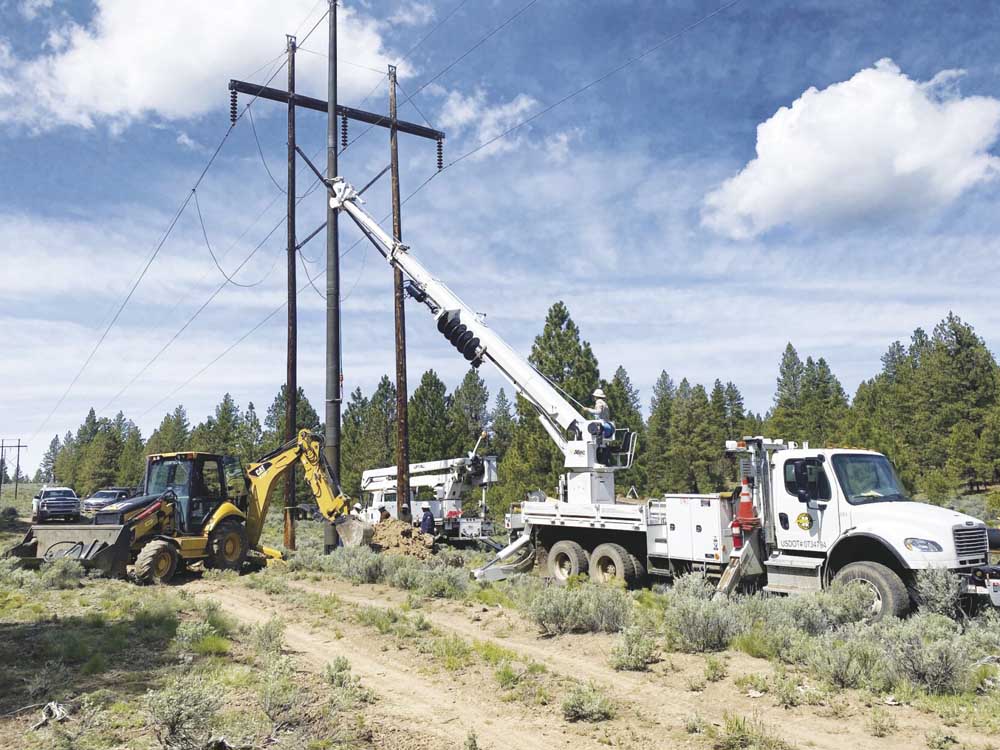BPA’s proposed rate hike could boost OTEC bills starting Oct. 1, 2025; capital credits refunds coming by end of 2024
Published 5:00 pm Wednesday, December 11, 2024

- Oregon Trail Electric Cooperative crews install an iron power pole in Grant County.
BAKER CITY — A proposed increase in wholesale power rates from the Bonneville Power Administration could boost bills for Oregon Trail Electric Cooperative members starting Oct. 1, 2025.
Trending
But nothing is certain, said Shane Stenquist, manager of communications for the member-owned cooperative, which supplies power to about 31,000 meters in Baker, Union, Grant and Harney counties.
OTEC has not increased rates in more than five years.
On Oct. 1, 2019, the cooperative raised the monthly delivery charge for residential customers by $4. The cost per kilowatt-hour did not change.
Trending
That decision was prompted by BPA’s 3.97% increase in its wholesale power rate.
Stenquist said OTEC buys all of its electricity from BPA, the federal agency that sells power produced at dams on the Columbia and Snake rivers. As a result, when BPA raises its wholesale rates, OTEC sometimes has to pass on a portion of the increase to its members, he said.
Since 2019, OTEC has been able to absorb escalating prices for materials other than electricity without increasing rates for its members.
“We’ve been very fortunate that we haven’t had a rate increase since 2019,” Stenquist said on Wednesday, Dec. 11.
He credited decisions by OTEC management and its board of directors to try to protect members from rate increases, including buying materials in bulk, and in some cases buying equipment before inflation buoyed the cost.
As an example, OTEC in 2021 ordered a new bucket truck for $350,000. Although due to supply chain issues during the pandemic the truck wasn’t delivered for about two years, the cost for the same vehicle today is about $200,000 more, Stenquist said.
Nonetheless, he acknowledged that OTEC can’t absorb cost increases, including for BPA power, indefinitely without passing on at least a portion to its members.
BPA announced in a press release on Monday, Dec. 9, that it is proposing to increase its power rates by 10.8% starting Oct. 1, 2025. The rates would be in place through Sept. 20, 2028.
“The proposed rate increases comes from a combination of inflationary pressure along with greater investments in maintaining and upgrading our power, transmission, and other infrastructure,” Joel Cook, BPA’s chief operating officer, said in the press release. “These investments are critically needed to position Bonneville to meet the growing energy needs of the Pacific Northwest region.”
Stenquist said OTEC officials talk occasionally with BPA, and were aware of the proposed rate increase.
“We see the same press releases,” he said.
Stenquist said OTEC officials are negotiating a new contract with BPA. Those are typically two-year contracts, although BPA can proposed a shorter duration.
Although it’s possible OTEC will need to increase rates starting Oct. 1, 2025, due to the BPA rate hike, Stenquist said that’s not definite.
“We honestly don’t know what it’s going to look like,” he said, referring to OTEC’s next contract with BPA.
If OTEC’s board decides to pass on some of the increased cost to members, the cooperative could boost power rates or, as it did in 2019, increase the monthly delivery charge, Stenquist said.
Both options “are on the table,” he said.
Increasing the rate per kilowatt-hour would ensure that members who use larger-than-average amounts of power would bear a proportionate share of the burden.
Increasing the delivery charge, by contrast, boosts everyone’s bill by the same amount, regardless of how much power they use.
Refunds on the way
Although a potential rate hike is possible in 2025, one thing is certain — OTEC members will, for the 28th straight year, receive a refund.
Known as capital credits, these are analogous to the dividends that shareholders in a for-profit company receive.
Capital credits are each member-owner’s share of OTEC’s margins earned during the year. Each year, after operating expenses have been paid, the remaining margins are returned to the member’s capital credit account based on the amount they were billed during previous years. Since OTEC first began retiring capital credits in 1996, the co-op has returned $58 million back to its members and communities, counting this year’s credits.
Stenquist said OTEC’s board approved a total of $3 million in capital credit refunds, the same amount as the previous two years.
Members will either receive a check by the end of 2024, or have a credit applied to their monthly bill.
Whether they get a check or credit depends on the amount of the capital credits refund. Stenquist said OTEC hasn’t determined the dollar amount threshold. Last year, members whose refund was more than $15 got a check.









